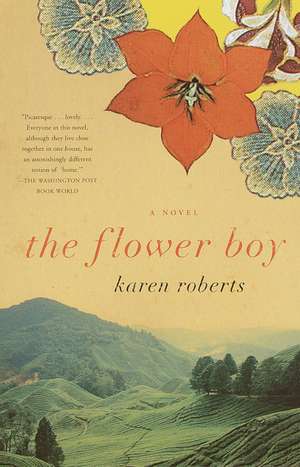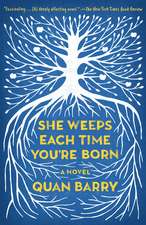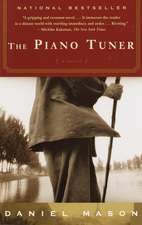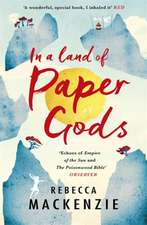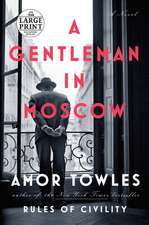The Flower Boy
Autor Karen Robertsen Limba Engleză Paperback – 30 noi 2001
In the colonial society of 1930s Ceylon, the separation between servant and master is clearly drawn. Young Chandi, however, knows that the baby born to his mother’s mistress will be his friend. And, indeed, their friendship blossoms in the lush gardens of the tea plantation on which they live. Many, English and Ceylonese, are troubled by the friendship, but the English planter is charmed by the children’s bond, and ultimately by Chandi’s mother, Premawathi. But the world encroaches on their Eden. Beautifully observed, compellingly plotted, The Flower Boy is a compassionate novel of a lost world and those who struggled to hold on to it.
Preț: 99.89 lei
Nou
Puncte Express: 150
Preț estimativ în valută:
19.12€ • 19.88$ • 15.78£
19.12€ • 19.88$ • 15.78£
Carte disponibilă
Livrare economică 24 martie-07 aprilie
Livrare express 08-14 martie pentru 54.95 lei
Preluare comenzi: 021 569.72.76
Specificații
ISBN-13: 9780375706813
ISBN-10: 037570681X
Pagini: 336
Dimensiuni: 133 x 203 x 19 mm
Greutate: 0.42 kg
Editura: Vintage Publishing
ISBN-10: 037570681X
Pagini: 336
Dimensiuni: 133 x 203 x 19 mm
Greutate: 0.42 kg
Editura: Vintage Publishing
Notă biografică
Born and raised in Sri Lanka, Karen Roberts now lives in California.
Extras
Chapter 1
It rained the day Lizzie was born. Not the gentle benediction god showers on newborn babies, but a screaming, sheeting downpour that turned the neatly mown lawns into squelching seas of mud.
The rain god was angry.
When they had built the projecting roof to protect the whitewashed walls of the bungalow, they had not taken his fury into consideration. Or maybe they had.
Maybe the rain god didn't like the idea of anything stopping him from making his fury felt. Maybe there wasn't a rain god at all.
Chandi flattened himself against the wall and thought these thoughts, while trying to lick raindrops that dripped off the end of his nose.
For all its violence, the rain tasted sweet.
The white walls were splattered with gray spots of damp that would remain like a faint accusation long after the rain had stopped.
It wasn't only Chandi's nose that the raindrops dripped off. They ran like tiny tributaries down the back of his neck, down the sides of his head where they dipped lazily into the whorls of his ears before continuing downward to join the streams running down his legs.
He wondered if the drain at his feet ran into a river that ran into the sea. He'd never seen the sea, for the towering mountains effectively blocked any view of it, but he knew it was there because he'd heard stories about it.
People in these parts called it the lake that roared. The hogana pokuna.
His too-small shirt was drenched, and stuck wetly to his skin like the slug on the wall behind him. He pulled it away from his stomach, but when he let go, it got sucked right back. A little pool of rainwater had collected in his navel, and he squeezed its edges together so the rain could creep out and join the river that ran into the sea.
His shorts were too big. They kept slipping down and he kept hitching them up. They had belonged to the Sudu Mahattaya's son, the one who was away in England. They had red and green checks and a mock belt.
They were his favorite shorts and he wished he weren't wearing them today. He was afraid that the red and green checks would wash away in the rain, like the whitewash. They hadn't as yet, but he was still worried.
Chandi remembered why he had worn his favorite shorts. It was his fourth birthday, although no one had remembered except him.
He wondered when he could go back inside. They hadn't said anything, and he had forgotten to ask. He wondered if they realized it was raining.
He sneezed loudly and wiped his nose with the back of his hand, examining the transparent streak of snot on it with interest. He held his hand out into the rain and watched it slide away. He wondered if it would eventually end up in the sea. Perhaps a fish would swallow it and sneeze it out. The thought of a fish sneezing made him laugh aloud.
Suddenly, the rain didn't seem angry and fierce, like Buster who lived outside the garage door. The lawn didn't look muddy and slippery and treacherous anymore; it looked like the best place in the world to play.
He ran out and gasped as large drops of rain hit him full in the face. Pennies from heaven. He had heard a song about that once on the gramophone.
At the edge of the lawn, he stepped carefully over the neatly trimmed hedge of green and brown and yellow croton plants and immediately felt the mud squelch between his toes.
To his surprise, it wasn't cold and slimy but warm and gooey, like melted chocolate. He wondered if it tasted like chocolate. He walked around lifting his feet high, like a water buffalo plowing up a paddy field.
He barely felt his feet slipping away from under him, hardly even knew he was falling, until his face hit the chocolate lake. He lay there with his eyes squeezed shut, wondering if he had been hurt. He moved his legs experimentally, then his arms. Everything worked. He opened his eyes and saw chocolate everywhere. He touched a tiny bit with his tongue. It didn't taste like chocolate, not that he remembered very well what chocolate tasted like; he had only eaten it twice.
But this didn't taste bad. It tasted of grass and clay. It smelled comfortable.
He stood up carefully and looked down at himself. Little patches of light brown skin, wet white shirt and green and red checks peeped through the mud that covered most of him. Even the rivers running down his body were murky brown. He touched his hair and his hand came away muddy. But the rain was already washing the mud away.
It was his shorts he was worried about.
The garden was deserted and the heavy curtains that framed the windows of the bungalow were drawn. Even Buster had stopped his incessant barking, as though realizing the futility of getting into a shouting match with the rain.
Chandi hesitated only for a moment, then stripped off his clothes and allowed the warm blanket of rain to envelop him. He laid his shorts carefully on the croton hedge and caught the end of his shirt, whirling it above his head before flinging it as far as he could. It did not fly as he had hoped. Instead, it plopped down into the mud, struggled briefly with the chocolate hands pulling it down, then sank heavily. It disappeared in less than a moment.
He lifted his hands up above his head and began swaying from side to side like one of the young coconut palms that flanked the front veranda. He threw back his head and thirstily drank the sweet, warm rain.
He wished he were a tree.
EVEN IN THE bigness of the rain, the house was big. Its red tiled roof sloped gently toward decorative projections, and underneath, black windows looked out like accusing eyes. The front veranda didn't look forbidding today; it looked a little forlorn.
Chandi knew exactly how many steps led into the veranda because he had counted them the last time the family had gone to Colombo for the weekend. He never told anyone. He knew he had broken a rule, and he had broken enough rules to know how much a tender guava branch, stripped of its leaves, could hurt the palm of his hand. Or the sensitive area just beneath his bottom.
He had done other things while the family was in Colombo. He had climbed up the guava tree that leaned drunkenly against the side of the house, crawled onto the roof and peeped through the decorative holes, into the bedrooms.
They were magnificent. Full of beautiful things like rugs and beds and wardrobes and armchairs and paintings on the walls and books. He hadn't been able to see the beautiful colorful pictures in the books, but he knew they were there. He had seen books, but only the ones in the church school he went to. Those books were mostly black and white and ugly. Like Buster.
His own room adjoining the kitchen, the one he shared with his mother and his two sisters, had peeling paint and curtains made from his mother's reddhas hanging on a rope strung across the room. The only things on the walls were the flower pictures from an old calendar rescued from a wastepaper basket, and the cracked mirror that divided his face into two not quite matched parts.
HE LISTENED CAREFULLY, but all he could hear was water dripping down the trelliswork and rushing through drains and gutters. He started running toward the veranda and then stopped. This was an adventure and he was a hero. Heroes swaggered.
He paused at the steps. He was afraid, but also tired of being afraid. If he were caught wet and naked his mother would probably bring out the guava cane. If he got caught wet and naked on the veranda, it would be the guava cane for sure.
The coir rug said WELCOME in curly writing, but Chandi wasn't to know that. They hadn't got that far in his English class. Water dripped off his body and disappeared into the depths of the mat.
The floors were red and shiny with recent polish. The six large ebony and rattan armchairs and the round table were black and shiny with recent beeswax. So were the tall ebony hat stand with its brass hooks (shiny with recent Brasso) and big oval mirror. The large double doors that led into the house were reassuringly shut.
He threw his head back, pushed his chest out and sauntered to the nearest armchair, the one the Sudu Mahattaya usually sat on. He climbed into it and sat down, his legs too short even to dangle.
"Krishnal" he called out peremptorily. "Bring me cuppa, good chap."
Krishna did not come, but Chandi did not mind. He opened up an imaginary newspaper and read, peering above imaginary spectacles, his head moving slowly from side to side.
He stayed there for about five minutes until a sudden vision of the guava cane jumped unbidden into his head. He scrambled down from the chair and tore out into the rain, slipping down the steps in his haste.
Off the veranda was the side lawn, so called because it was at the side of the bungalow. It was bordered by more crotons and beds of daisies whose heads hung low against the watery onslaught. Many of them had simply lain down in defeat, their lacy leaves now buried in a muddy grave.
The side lawn continued to the high boundary wall, along which ran a narrow passage that continued around the house. On the other side of the passage was the side of the house, occasionally punctuated by closed doors and windows. The windows were high and Chandi was not, so even if the drapes had been open, which they were not, no one would have seen him slide past like a shiny brown otter.
He reached the side veranda safely: he was now on dangerous territory. There was a door that led into the dining room and although it was shut, Chandi was still careful not to make any noise.
It was here that the Sudu Nona kept the huge stone vats in which she stored wine at Christmastime. Chandi's mother helped make the ginger, damson and lovi wine, which would then be left to ferment for weeks before being poured into crystal decanters to be served to guests from neighboring bungalows.
Now it was May and Christmas was long over, so there was no wine. Now the vats were filled with ginger beer. He looked around, but the only signs of life were the caterpillars sheltering under furry begonia leaves. He pulled the heavy lid off the nearest vat and stuck his hand in. He didn't like ginger beer; it burned his tongue. But the raisins the Sudu Nona put in it didn't.
They were brown and wrinkled when they went in. Being drowned in ginger beer made them swell up and became smooth and plump. His hand found four and he popped them into his mouth, chewing contentedly as he made his way down the passage.
Passion fruit creepers crept up this wall of the house, their bright purple flowers defiant against the wind and rain. Smooth light green fruit, speckled with lighter green freckles, hung like Vesak lanterns among the leaves.
Chandi stopped and scanned the creepers for ripe fruit. They would be golden, their smooth skins just beginning to wrinkle with age. The flesh inside was tart and soft with little black seeds that cracked with a snap if you bit them between your teeth. There were none; Krishna had obviously been here earlier on. He picked a corkscrew tendril and wrapped it round his index finger like a ring. He plucked two more, hung them on his ears and minced on.
Now the passage was narrower, overgrown with thuththiri weeds and thampala plants, which made skin itch if you rubbed against them. There were broken bricks and bottles strewn around so he trod carefully. This part led to the back garden, the kitchen garden.
He emerged among waist-high aubergine and green chili plants and headed for the rickety wooden frame over which spinach and tomatoes grew in wild profusion.
A streak of lightning lit up the sky, momentarily transforming it into a silver sheet. Loud thunder crashed immediately afterward, making Chandi jump. He felt suddenly small and afraid, and longed to bury his face in his mother's soft warm lap.
He made his way back to his leafy hideout of the tomato and spinach frame and, crouching double to prevent the rough sticks from digging into his head, hurried toward the kitchen. The door was wide open, as usual, and when he peeped in he saw it was empty.
Everyone was somewhere else.
He was about to go in, when he suddenly remembered he was stark naked and his clothes were far away. He crept back into his hideout and sat there listening to the storm crashing overhead, and to his loud thoughts.
HE WAS STARVING. Rainy days always made him hungry, but rainy days like this made him feel he could eat three breakfasts in one single gulp. Thinking of food made him hungrier still. It felt like a long, long time, although in fact only two hours had passed, since he had wolfed down the roti and mulberry jam his mother had given him.
The jam had been unexpected. Everyone in the bungalow was so involved in the imminent arrival of the new Sudu Baby that no one had noticed his mother surreptitiously dip a spoon into the precious pot of mulberry jam on the dining table.
She had told him, "Eat it quickly before someone comes in. One day I'll get into trouble because of you! Jam! What next!"
He didn't know what next. Maybe she was talking about lunch. More mulberry jam. The funny thing was, he didn't know why she was angry with him. He hadn't asked for the jam. If it hadn't been there he wouldn't have missed it. He didn't even know if he liked mulberry jam. Maybe she did, and was angry that she couldn't have some herself. That sounded like a logical explanation, and he decided he was satisfied with it.
But then there was the other funny thing. Ammi (that was what he called his mother because he was only four; Rangi and Leela called her Amma but they were seven and ten), Ammi had made the mulberry jam.
He knew that because he had helped her pick the ripe mulberries from the four trees behind the garage where the Sudu Mahattaya's big silver car reposed in all its splendid, pampered glory. He had seen her cook them in the big pot that she called "my jam pot and let me not catch anyone using it for anything else."
Since Ammi had picked the mulberries and made the jam, didn't that make it her jam? And since he was her son, didn't that, in a slightly removed way, make it his jam too?
A fierce gust of wind drove a splatter of big, painful raindrops into the shelter and into his face. He shut his eyes and concentrated on finding a logical explanation for this new dilemma.
A drenched frog sat between the drain and Chandi's bare feet and croaked hoarsely, trying to make itself heard above the rain and Chandi's thoughts.
An hour later, Chandi was no closer to an answer, and besides, all this thinking about mulberry jam was making him hungry again.
He wondered how long it took for a baby to be born.
It rained the day Lizzie was born. Not the gentle benediction god showers on newborn babies, but a screaming, sheeting downpour that turned the neatly mown lawns into squelching seas of mud.
The rain god was angry.
When they had built the projecting roof to protect the whitewashed walls of the bungalow, they had not taken his fury into consideration. Or maybe they had.
Maybe the rain god didn't like the idea of anything stopping him from making his fury felt. Maybe there wasn't a rain god at all.
Chandi flattened himself against the wall and thought these thoughts, while trying to lick raindrops that dripped off the end of his nose.
For all its violence, the rain tasted sweet.
The white walls were splattered with gray spots of damp that would remain like a faint accusation long after the rain had stopped.
It wasn't only Chandi's nose that the raindrops dripped off. They ran like tiny tributaries down the back of his neck, down the sides of his head where they dipped lazily into the whorls of his ears before continuing downward to join the streams running down his legs.
He wondered if the drain at his feet ran into a river that ran into the sea. He'd never seen the sea, for the towering mountains effectively blocked any view of it, but he knew it was there because he'd heard stories about it.
People in these parts called it the lake that roared. The hogana pokuna.
His too-small shirt was drenched, and stuck wetly to his skin like the slug on the wall behind him. He pulled it away from his stomach, but when he let go, it got sucked right back. A little pool of rainwater had collected in his navel, and he squeezed its edges together so the rain could creep out and join the river that ran into the sea.
His shorts were too big. They kept slipping down and he kept hitching them up. They had belonged to the Sudu Mahattaya's son, the one who was away in England. They had red and green checks and a mock belt.
They were his favorite shorts and he wished he weren't wearing them today. He was afraid that the red and green checks would wash away in the rain, like the whitewash. They hadn't as yet, but he was still worried.
Chandi remembered why he had worn his favorite shorts. It was his fourth birthday, although no one had remembered except him.
He wondered when he could go back inside. They hadn't said anything, and he had forgotten to ask. He wondered if they realized it was raining.
He sneezed loudly and wiped his nose with the back of his hand, examining the transparent streak of snot on it with interest. He held his hand out into the rain and watched it slide away. He wondered if it would eventually end up in the sea. Perhaps a fish would swallow it and sneeze it out. The thought of a fish sneezing made him laugh aloud.
Suddenly, the rain didn't seem angry and fierce, like Buster who lived outside the garage door. The lawn didn't look muddy and slippery and treacherous anymore; it looked like the best place in the world to play.
He ran out and gasped as large drops of rain hit him full in the face. Pennies from heaven. He had heard a song about that once on the gramophone.
At the edge of the lawn, he stepped carefully over the neatly trimmed hedge of green and brown and yellow croton plants and immediately felt the mud squelch between his toes.
To his surprise, it wasn't cold and slimy but warm and gooey, like melted chocolate. He wondered if it tasted like chocolate. He walked around lifting his feet high, like a water buffalo plowing up a paddy field.
He barely felt his feet slipping away from under him, hardly even knew he was falling, until his face hit the chocolate lake. He lay there with his eyes squeezed shut, wondering if he had been hurt. He moved his legs experimentally, then his arms. Everything worked. He opened his eyes and saw chocolate everywhere. He touched a tiny bit with his tongue. It didn't taste like chocolate, not that he remembered very well what chocolate tasted like; he had only eaten it twice.
But this didn't taste bad. It tasted of grass and clay. It smelled comfortable.
He stood up carefully and looked down at himself. Little patches of light brown skin, wet white shirt and green and red checks peeped through the mud that covered most of him. Even the rivers running down his body were murky brown. He touched his hair and his hand came away muddy. But the rain was already washing the mud away.
It was his shorts he was worried about.
The garden was deserted and the heavy curtains that framed the windows of the bungalow were drawn. Even Buster had stopped his incessant barking, as though realizing the futility of getting into a shouting match with the rain.
Chandi hesitated only for a moment, then stripped off his clothes and allowed the warm blanket of rain to envelop him. He laid his shorts carefully on the croton hedge and caught the end of his shirt, whirling it above his head before flinging it as far as he could. It did not fly as he had hoped. Instead, it plopped down into the mud, struggled briefly with the chocolate hands pulling it down, then sank heavily. It disappeared in less than a moment.
He lifted his hands up above his head and began swaying from side to side like one of the young coconut palms that flanked the front veranda. He threw back his head and thirstily drank the sweet, warm rain.
He wished he were a tree.
EVEN IN THE bigness of the rain, the house was big. Its red tiled roof sloped gently toward decorative projections, and underneath, black windows looked out like accusing eyes. The front veranda didn't look forbidding today; it looked a little forlorn.
Chandi knew exactly how many steps led into the veranda because he had counted them the last time the family had gone to Colombo for the weekend. He never told anyone. He knew he had broken a rule, and he had broken enough rules to know how much a tender guava branch, stripped of its leaves, could hurt the palm of his hand. Or the sensitive area just beneath his bottom.
He had done other things while the family was in Colombo. He had climbed up the guava tree that leaned drunkenly against the side of the house, crawled onto the roof and peeped through the decorative holes, into the bedrooms.
They were magnificent. Full of beautiful things like rugs and beds and wardrobes and armchairs and paintings on the walls and books. He hadn't been able to see the beautiful colorful pictures in the books, but he knew they were there. He had seen books, but only the ones in the church school he went to. Those books were mostly black and white and ugly. Like Buster.
His own room adjoining the kitchen, the one he shared with his mother and his two sisters, had peeling paint and curtains made from his mother's reddhas hanging on a rope strung across the room. The only things on the walls were the flower pictures from an old calendar rescued from a wastepaper basket, and the cracked mirror that divided his face into two not quite matched parts.
HE LISTENED CAREFULLY, but all he could hear was water dripping down the trelliswork and rushing through drains and gutters. He started running toward the veranda and then stopped. This was an adventure and he was a hero. Heroes swaggered.
He paused at the steps. He was afraid, but also tired of being afraid. If he were caught wet and naked his mother would probably bring out the guava cane. If he got caught wet and naked on the veranda, it would be the guava cane for sure.
The coir rug said WELCOME in curly writing, but Chandi wasn't to know that. They hadn't got that far in his English class. Water dripped off his body and disappeared into the depths of the mat.
The floors were red and shiny with recent polish. The six large ebony and rattan armchairs and the round table were black and shiny with recent beeswax. So were the tall ebony hat stand with its brass hooks (shiny with recent Brasso) and big oval mirror. The large double doors that led into the house were reassuringly shut.
He threw his head back, pushed his chest out and sauntered to the nearest armchair, the one the Sudu Mahattaya usually sat on. He climbed into it and sat down, his legs too short even to dangle.
"Krishnal" he called out peremptorily. "Bring me cuppa, good chap."
Krishna did not come, but Chandi did not mind. He opened up an imaginary newspaper and read, peering above imaginary spectacles, his head moving slowly from side to side.
He stayed there for about five minutes until a sudden vision of the guava cane jumped unbidden into his head. He scrambled down from the chair and tore out into the rain, slipping down the steps in his haste.
Off the veranda was the side lawn, so called because it was at the side of the bungalow. It was bordered by more crotons and beds of daisies whose heads hung low against the watery onslaught. Many of them had simply lain down in defeat, their lacy leaves now buried in a muddy grave.
The side lawn continued to the high boundary wall, along which ran a narrow passage that continued around the house. On the other side of the passage was the side of the house, occasionally punctuated by closed doors and windows. The windows were high and Chandi was not, so even if the drapes had been open, which they were not, no one would have seen him slide past like a shiny brown otter.
He reached the side veranda safely: he was now on dangerous territory. There was a door that led into the dining room and although it was shut, Chandi was still careful not to make any noise.
It was here that the Sudu Nona kept the huge stone vats in which she stored wine at Christmastime. Chandi's mother helped make the ginger, damson and lovi wine, which would then be left to ferment for weeks before being poured into crystal decanters to be served to guests from neighboring bungalows.
Now it was May and Christmas was long over, so there was no wine. Now the vats were filled with ginger beer. He looked around, but the only signs of life were the caterpillars sheltering under furry begonia leaves. He pulled the heavy lid off the nearest vat and stuck his hand in. He didn't like ginger beer; it burned his tongue. But the raisins the Sudu Nona put in it didn't.
They were brown and wrinkled when they went in. Being drowned in ginger beer made them swell up and became smooth and plump. His hand found four and he popped them into his mouth, chewing contentedly as he made his way down the passage.
Passion fruit creepers crept up this wall of the house, their bright purple flowers defiant against the wind and rain. Smooth light green fruit, speckled with lighter green freckles, hung like Vesak lanterns among the leaves.
Chandi stopped and scanned the creepers for ripe fruit. They would be golden, their smooth skins just beginning to wrinkle with age. The flesh inside was tart and soft with little black seeds that cracked with a snap if you bit them between your teeth. There were none; Krishna had obviously been here earlier on. He picked a corkscrew tendril and wrapped it round his index finger like a ring. He plucked two more, hung them on his ears and minced on.
Now the passage was narrower, overgrown with thuththiri weeds and thampala plants, which made skin itch if you rubbed against them. There were broken bricks and bottles strewn around so he trod carefully. This part led to the back garden, the kitchen garden.
He emerged among waist-high aubergine and green chili plants and headed for the rickety wooden frame over which spinach and tomatoes grew in wild profusion.
A streak of lightning lit up the sky, momentarily transforming it into a silver sheet. Loud thunder crashed immediately afterward, making Chandi jump. He felt suddenly small and afraid, and longed to bury his face in his mother's soft warm lap.
He made his way back to his leafy hideout of the tomato and spinach frame and, crouching double to prevent the rough sticks from digging into his head, hurried toward the kitchen. The door was wide open, as usual, and when he peeped in he saw it was empty.
Everyone was somewhere else.
He was about to go in, when he suddenly remembered he was stark naked and his clothes were far away. He crept back into his hideout and sat there listening to the storm crashing overhead, and to his loud thoughts.
HE WAS STARVING. Rainy days always made him hungry, but rainy days like this made him feel he could eat three breakfasts in one single gulp. Thinking of food made him hungrier still. It felt like a long, long time, although in fact only two hours had passed, since he had wolfed down the roti and mulberry jam his mother had given him.
The jam had been unexpected. Everyone in the bungalow was so involved in the imminent arrival of the new Sudu Baby that no one had noticed his mother surreptitiously dip a spoon into the precious pot of mulberry jam on the dining table.
She had told him, "Eat it quickly before someone comes in. One day I'll get into trouble because of you! Jam! What next!"
He didn't know what next. Maybe she was talking about lunch. More mulberry jam. The funny thing was, he didn't know why she was angry with him. He hadn't asked for the jam. If it hadn't been there he wouldn't have missed it. He didn't even know if he liked mulberry jam. Maybe she did, and was angry that she couldn't have some herself. That sounded like a logical explanation, and he decided he was satisfied with it.
But then there was the other funny thing. Ammi (that was what he called his mother because he was only four; Rangi and Leela called her Amma but they were seven and ten), Ammi had made the mulberry jam.
He knew that because he had helped her pick the ripe mulberries from the four trees behind the garage where the Sudu Mahattaya's big silver car reposed in all its splendid, pampered glory. He had seen her cook them in the big pot that she called "my jam pot and let me not catch anyone using it for anything else."
Since Ammi had picked the mulberries and made the jam, didn't that make it her jam? And since he was her son, didn't that, in a slightly removed way, make it his jam too?
A fierce gust of wind drove a splatter of big, painful raindrops into the shelter and into his face. He shut his eyes and concentrated on finding a logical explanation for this new dilemma.
A drenched frog sat between the drain and Chandi's bare feet and croaked hoarsely, trying to make itself heard above the rain and Chandi's thoughts.
An hour later, Chandi was no closer to an answer, and besides, all this thinking about mulberry jam was making him hungry again.
He wondered how long it took for a baby to be born.
Recenzii
“Picaresque…lovely…. Everyone in this novel, although they live close together in one house, has an astonishingly different notion of ‘home.’”–The Washington Post Book World
“A wonderfully calm book…. [I]t has a truly lyrical and musical quality.”–Penelope Fitzgerald
“A wonderfully calm book…. [I]t has a truly lyrical and musical quality.”–Penelope Fitzgerald
